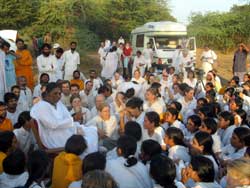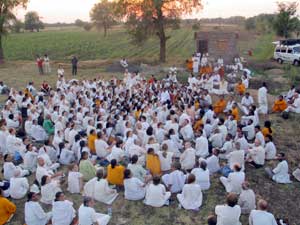Tuesday, 9 March — en route to Ahmedabad, Gujarat — Bharata Yatra 2004

When many people from affluent Western countries visit India for the first time, they are overwhelmed by the immensity of its poverty and the extent to which some of its people are suffering. They simply haven’t seen “villages” of families attempting to construct homes out of trash before. They are not used to watching legless women drag themselves down the street by their hands, leprosy, street children with stomachs so bloated they look like they might pop.
Traveling along India’s highways and visiting her major cities with Amma is the time when many of Amma’s children–from the West and from the East–get their first real taste of the miseries of the world. This was the case for one young American woman accompanying Amma on Her 2004 North Indian Tour. So when Amma asked Her children for questions during a roadside tea stop on the way to Ahmedabad, the lady spoke up. She told Amma just how difficult it was for her to witness what she was seeing, how it was making her quite emotional–even depressed. She asked Amma for advice as to what she should do.
Amma seemed to pay keen attention as the brahmachari at Her side translated the lady’s question, then She spoke: “This journey with Amma is to understand the sorrows and sufferings of this world. We should only take what we need from the world. To appease our hunger, we need food. To cover our bodies, we need clothes.”
Then Amma said something that was beginning to seem like Her mantra for the tour. She had said it so many times–practically, at every stop. It was a proclamation of the beauty and power of renunciation: “When you take, you become a beggar. When you give, you become a king.”

Amma then went on to explain how there are 24 hours in a day, and that we should try to use some of that time for uplifting the poor. She explained how each of us has different capacities, and we should use whatever capacities we have to help others. Amma then suggested that some people could make and sell handicrafts with the profits going to the poor. Those with high education, She said, can teach others. “Our abilities and skills in a given field only increase when we share them.”
Amma told the lady that She was advising her in this way because she was a spiritual person and she had asked Amma. “Worldly people don’t concern themselves with such things,” She said. “They are focused only on earning for themselves.”
Amma said how some of Her children have even worn the same shoes for 25 years in order to save money with which to help the poor, and how all of us can start giving away our old clothes that we no longer use to help the less fortunate. “There are children who have reduced the number of saris, clothes, jewellery, fancy food and luxuries they buy every year, and then are giving what they save to Amma,” She said. “Small children sell flowers, food and malas. Flea-markets, washing and parking cars–all these are ways in which Amma’s children around the world are raising money to help the ashram in its charitable activities. If many people like you start thinking along these lines, we can change the face of this earth.”
Amma then told an anecdote about someone watching the nightly news after the Gujarat earthquake: “Watching the TV,” he later told his friend, “I felt so sad.” “What did you do?” his friend asked. “I changed the channel.”
“Sympathy is not enough,” Amma said. “It won’t be complete. You have to expand and live a life of sacrifice, reducing luxuries.”
“When you take, you become a beggar. When you give, you become a king.”
–Sakshi
